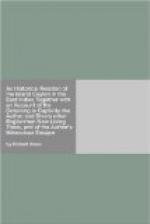[Their Doctrins and Opinions.] These people do firmly believe a resurrection of the body, and the Immortality of Souls, and a future State. Upon which account they will worship their Ancestors. They do beleive that those they call Gods are the spirits of men that formerly have lived upon the earth. They hold that in the other world, those that are good men tho they be poor and mean in this world, yet there they shall become high and eminent; and that wicked men shall be turned into beasts. There is a Spider among them, that breeds an Egg, which she carries under her belly, ’tis as wide as groat, and bigger then the body of the Spider. This egg is full of young Spiders that breed there: it hangs under her belly wheresoever she goes: and as their young ones grow to bigness they eat up the old one. Now the Chingulayes say, that disobedient children shall become Spiders in the other world, and their young ones shall eat them up.
They hold that every mans good or bad Fortune was predetermined by God, before he was born, according to an usual Proverb they have, Ollua cottaula tiana, It is written in the head.
[The highest points of Devotion.] They reckon the chief poynts of goodness to consist in giving to the Priests, in making Pudgiahs, Sacrifices to their Gods, in forbearing shedding the blood of any creature: which to do they call Pau boi, a great Sin: and in abstaining from eating any flesh at all, because they would not have any hand, or any thing to do in killing any living thing. They reckon Herbs and Plants more innocent food. It is religion also to sweep under the Bogaha or God-Tree, and keep it clean. It is accounted religion to be just and sober and chast and true and to be endowed with other vertues, as we do account it.
[Their Charity.] They give to the poor out of a Principle of Charity, which they extend to forraigners, as well as to their own Country-men. But of every measure of rice they boyl in their houses for their families they will take out an handful, as much as they can gripe, and put into a bag, and keep it by it self, which they call Mitta-haul. And this they give and distribute to such poor as they please, or as come to their doors.
[The priviledg of the Moorish beggars.] Nor are they charitable only to the poor of their own Nation, but as I said to others: and particularly to the Moorish beggars, who are Mahometans by religion. These have a Temple in Cande. A certain former king gave this Temple this Priviledg, that every Free-holder should contribute a Ponnam to it. And these Moors go to every house in the land to receive it. And if the house be shut, they have power to break it open, and to take out of goods to the value of it. They come very confidently when they beg, and they say they come to fulfill the peoples charity. And the people do liberrally releive them for charity sake.
There is only one County in the Land, viz. Dolusbaug, that pays not the aforesaid duty to the Moors Temple. And the reason is, that when they came first thither to demand it, the Inhabitants beat them away. For which act they are free from the payment of that Ponnam and have also another priviledg granted them for the same, That they pay no Marral, or Harriots, to the King as other Countreys do.




